- Home
- Patrick O'Brian
H.M.S. Surprise Page 26
H.M.S. Surprise Read online
Page 26
By this time Jack had begun his ritual pace from the break of the quarterdeck to the taffrail: at each turn he glanced up at the rigging and across the sea to the distant chase—for chase she had become in the frigate's predatory eyes, although in fact she was not in flight: far from it—her course lay rather towards the Surprise than from her. At this moment she was a whiteness just clear of the larboard lower studdingsail, and if she held her luff she would soon disappear behind it. Now that the whole of the fresh impulse had been transmitted to the frigate's hull, now that her upper masts had ceased their momentary complaint and that the backstays were less iron-taut, she was racing through the water: she had nothing on her mizzenmast; on her main, topsail, topgallant with studdingsails on either side, and royal, her mainsail being hauled up to let the wind into her foresail; and on her foremast, the course with both lower studdingsails spread like wings, no topsail—the maintopsail would have becalmed it—but the topsail yard on the masthead and its studdingsails set. She was running very smoothly, rippling over the swell with an eager forward thrust, not a hint of steering wild: their courses should converge in about an hour at this rate. Rather less: he might have to reduce sail. And if the chase wore and fled, he still had his spritsail and the kites in hand, as well as an advantage of some two or three knots, in all likelihood.
The civilians had been reduced to silence or shepherded below; Mr Stourton was hurrying quietly about, making ready for the possible order to clear for action; and in the silence of voices, but almost silence of the following wind, all that was to be heard was the steady run of water along her side, an urgent bubbling rush that mingled with the higher excited tumult of her wake.
Six bells. Braithwaite, the mate of the watch, came to the rail with the log. 'Is the glass clear?' he cried.
'All clear, sir,' said the quartermaster.
Braithwaite heaved the log. It shot astern. 'Turn,' he said, as the mark tore through his fingers, the reel screeching aloud.
'Stop!' shouted the quartermaster, twenty-eight seconds later.
'Eleven knots and six fathoms, sir, if you please,' reported Braithwaite to Pullings, official gravity fighting a losing battle with delight. All hands were listening nakedly, a murmur of intense satisfaction ran through the ship.
'Give it her,' said Pullings, and stepped closer to Jack's path.
'How do we come along, Mr Pullings?' said he.
'Eleven knots and six fathoms, sir, if you please,' said Pullings with a grin.
'Hey, hey,' cried Jack. 'I scarcely believed it could be so much.' He looked lovingly along her deck and up to where her pendant flew out in a curving flame fifty foot long, almost straight ahead. She was indeed a noble ship: she always had been, but she had never run eleven knots six fathoms off the reel when he was a boy. By now the chase had vanished from his view, and if she held her course he would not see her again until she was within gunshot, unless he went forward. Stephen was sitting on the capstan, eating a mangosteen and staring at the mongoose as it played with his handkerchief, tossing it up, catching it, worrying it to death.
'We are running eleven knots six,' said Jack.
'Oh,' said Stephen, 'I am sorry to hear it—most concerned. Is there no remedy?'
'I fear not,' said Jack, shaking his head. 'Do you choose to walk forward?'
From the forecastle she was even nearer than he had expected: hull up—same sails, same course.
'I speak under correction, and with great diffidence,' said Stephen as Jack fixed her in his glass, 'but I should have supposed our progress satisfactory, seeing that the vessel is notoriously weak and old, even decrepit. See how she dashes the foam aside—see how the water is as it was excavated in a deep trough on either bow. I can see a yard of her copper at least: I never remember to have seen so deeply down her side. From the flying spray alone—and my good coat is soaked—I should have judged our pace adequate; unless indeed we are to indulge in this modern frenzy for speed.'
'It is not our speed that is unsatisfactory,' said Jack. He lowered the telescope, wiped the object-glass, and peered again. 'It is that ugly Dutch-built interloping tub.' And to be sure the tension on the forecastle had been slackening fast as the probable nature of the chase became more and more apparent. In all likelihood she was one of the Company's country ships, bound for Bombay. What else would have held an untroubled course, with a man-of-war bearing down on her under a press of sail? Her chequered sides, her ten gun-ports, her martial air, might deceive foreigners; but the Navy had smoked her at once for a vile merchantman, no enemy nor no prize.
'Well, I am glad we did not clear away even the bow-chasers,' said Jack, walking aft. 'Proper flats we should have looked, if we had run alongside, stripped and bristling with guns. Mr Pullings, you may take in the royal and the topgallant-studdingsails.'
Half an hour later the two ships lay hove-to with backed topsails, wallowing in the swell, and the master of the Seringapatam came across Navy-fashion in an elegant barge with a uniformed crew. He came grunting up the side, followed by a Lascar with a parcel, saluted the quarterdeck and limped towards Jack with a smile on his face and his hand held out. 'You do not recognise me, sir,' he said. 'Theobald, of the Orion.'
'Theobald, God love you,' cried Jack, all his reserve vanishing at once 'How happy I am to see you, Killick, Killick—where is that mumping villain?'
'What now?' said Killick angrily, two feet behind him. 'Sir.'
'Iced punch in the coach, and bear a hand.'
'How d'ye do, Killick?' said Theobald.
'Tolerable, sir, I thank you: up to my duty, sir, though harduous. We was wholly grieved to hear of your mishap, sir.'
'Thankee, Killick. Yet it is a saving in neat's leather, you know. We made out the Surprise the moment you was topsails up,' he said to Jack. 'I never thought to see that taut old mainmast again.'
'You had no notion of our being Linois?'
'God bless you, no! He will be in the Isle of France by now, if not at the Cape. Quite out of these waters.'
They walked into the forecabin; and when at last they walked out again, Theobald was a fine deep crimson and Jack not much lighter; and their strong nautical voices could be heard from one end of the ship to the other. Theobald gripped the side-ropes, and by the strength of his arms alone he let himself down, his face disappearing like a setting sun. When he had seen his friend bob over the water and swarm aboard the Seringapatam, and when the ships had parted with the usual civilities, Jack turned to Stephen and said, 'Well, that was a sad disappointment for you, I am afraid: not so much as a gun. Come and help me finish the punch: it is the last of the snow, and God knows when you will have a cool drink again, this side of Java.'
In the cabin he said, 'I must beg your pardon for not naming Theobald to you. But there is nothing so tedious as sitting by when two old shipmates are calling out, "Do you remember the three days' blow in the Mona Passage?—Do you remember Wilkins and his timenoguy?—What has happened to old Blodge?" He is a fine fellow, however, capital seaman; but having no interest he could not get a command—eighteen years a lieutenant. Indeed, having contrived to blow off his leg, he could not get a ship, either; so he turned to the Company, and here he is commanding a tea-wagon. Poor chap: how lucky I am, in comparison of him.'
'Certainly. I feel much for the gentleman. But he seems to be of a sanguine humour, and Pullings tells me the captains of Indiamen become exceedingly rich—they shake the pagoda-tree like true British tars.'
'Rich? Oh, yes, they wallow in gold. But he will never hoist his flag! No, no, poor fellow, he will never hoist his flag. however, old shipmate or not, he had wretched news for us: first, that Linois had taken his squadron off to the Isle of France to refit—they must be infernally short of stores, with no port this side of the ocean—so they cannot be back in these waters this monsoon, if at all: not within three thousand miles of us. And second, that the Company's China fleet has sailed—he had had news of them in the Sunda Strait—so we shall not meet 'em.'
'What of it?'
'I had so looked forward to getting my packet off to England. And I am sure you would have liked to do the same. However, salt water washes away disappointment as well as other things. I have often been amazed at how you forget, after a few days at sea. You might be sailing in Lethe, once you have sunk the land. I said, you might be sailing in Lethe, once you have sunk the land.'
'Yes. I heard you. I do not agree. What is the object behind you, on the locker?'
'It is a case of pistols.'
'No, no. The ill-wrapped parcel, from which feathers protrude.'
'Oh, that. I had meant to show it you earlier. Theobald brought it me. It is for Sophie—a paradise-bird. Was it not handsome in him? But he was always as open-handed as the day. He picked it up some time ago, in the Spice Islands; and he very candidly told me he had meant it for his sweetheart, to put in her hat. But it seems she turned sour and threw him over for a cove in the law line, I believe: the Secondary of the Poultry Compter. He did not mind it much, he said—what could a fellow with a wooden leg expect?—and he wished them happiness in this very bowl. But he hoped it would bring me better luck. Do you feel it might be a trifle ostentatious in a hat? Perhaps more suitable for a chimney-piece, or a fire-screen?'
'What emerald splendour! What a demi-ruff—I hardly know what to call it. What a tail! Never have I beheld such extreme delicate magnificence. A cock bird, of course.' He sat handling the brilliant feathers, the improbable streaming tail; and Jack pondered mildly over a joke, or pun, connecting this fowl with the Poultry Compter; but abandoned it as heartless to Theobald.
Stephen said, 'Have you ever contemplated upon sex, my dear?'
'Never,' said Jack. 'Sex has never entered my mind, at any time.'
'The burden of sex, I mean. This bird, for example, is very heavily burdened; almost weighed down. He can scarcely fly or pursue his common daily round with any pleasure to himself, encumbered by a yard of tail and all this top-hamper. All these extravagant plumes have but one function—to induce the hen to yield to his importunities. How the poor cock must glow and burn, if these are, as they must be, an index of his ardour.'
'That is a solemn thought.'
'Were he a capon, now, his life would be easier by far. These spurs, these fighting spurs, would vanish; his conduct would become peaceable, social, complaisant and mild. Indeed, were I to castrate all the Surprises, Jack, they would grow fat, placid and unaggressive; this ship would no longer be a man-of-war, darting angrily, hastily from place to place; and we should circumnavigate the terraqueous globe with never a harsh word. There would be none of this disappointment in missing Linois.'
'Never mind the disappointment. Salt water will wash it away. You will be amazed how unimportant it will seem in a week's time—how everything will fall into place.'
It was the true word: once the Surprise had turned south about Ceylon to head for the Java Sea, the daily order seized upon them all. The grind of holystones, the sound of swabs and water on the decks at first light; hammocks piped up, breakfast and its pleasant smells; the unvarying succession of the watches; noon and the altitude of the sun, dinner, grog; Roast Beef of Old England on the drum for the officers; moderate feast; quarters, the beating of the retreat, the evening roar of guns, topsails reefed, the setting of the watch; and then the long warm starlight, moonlit evenings, often spent on the quarterdeck, with Jack leading his two bright midshipmen through the intricate delights of astral navigation. This life, with its rigid pattern punctuated by the sharp imperative sound of bells, seemed to take on something of the nature of eternity as they slanted down towards the line, crossing it in ninety-one degrees of longitude east of Greenwich. The higher ceremonies of divisions, of mustering by the open list, church, the Articles of War, marked the due order of time rather than its passage; and before they had been repeated twice most of the frigate's people felt both past and future blur, dwindling almost into insignificance: an impression all the stronger since the Surprise was once more in a lonely sea, two thousand miles of dark blue water with never an island to break its perfect round: not the faintest smell of land even on the strongest breeze—the ship was a world self-contained, swimming between two perpetually-renewed horizons. Stronger still, because in these waters there was no eager impatience to see over the eastward rim: they sailed with no relation to an enemy, nor to any potential prize The Dutch were bottled up; the French had disappeared; the Portuguese were friends.
They were not idle. Mr Stourton had a high notion of a first lieutenant's duties, a religious horror of anything approaching dirt or shakings; his speaking-trumpet was rarely out of his hand, and the cry of 'Sweepers, sweepers!' resounded through the ship as often as the voice of the cuckoo in May, and with something of the same intonation.
He had at once fallen in with his captain's views on discipline, and with great relief, but the force of habit was strong, and the Surprise might have been inspected by an admiral any day without having to blush for it. Stourton was much more efficient than Hervey; it was clear that he could see to the daily running of the ship—in a thoroughly-worked-up frigate with a captain who knew what he was about, any fairly competent officer could have done so, but Stourton did it excellently. It is true that the midshipmen's berth often wished him in hell in the early morning, but his natural cheerfulness was a real addition to the domestic comfort of the gun-room.
The frigate's sailing qualities were Jack's concern, however. His master, Harrowby, was no phoenix, either in navigation or seamanship. In the hurry of their departure Harrowby had allowed an imperfect stowing of the hold, and the ship, as soft-mouthed as a filly with her fine narrow entry, would neither lie as close to the wind as Jack could have wished nor stay with the smooth and certain rapidity that was in her power. She was splendid, sailing large—had never been better; but by the wind she left much to be desired; there was a slowness, a tendency to gripe, and want of ease that no fresh combination of sails would overcome; and it was not until they reached the line that pumping their water from one tier to another and shifting several thousand shot brought her by the stern enough to give him some ease of mind: it was only a half-measure, to be sure, and the true solution must wait until they could land a mass of stores, come at the ballast and the ground-tier, and restow the hold; but even this alteration in her trim made her a pleasure to steer.
He had a great deal to do; so had the frigate's people; but there were many evenings when the hands danced and sang on the forecastle, and when Jack and Stephen played, sometimes in their narrow coach, sometimes on the quarterdeck, and sometimes in the great cabin—trios with Mr Stanhope, who blew a tremulous, small-voiced flute, and who had a great deal of sheet-music by him.
The envoy's delicate health had taken great benefit from Bombay, and after his week of sea-sickness his strength and spirits recovered remarkably. He and Stephen often sat together, hearing one another their Malay verbs or rehearsing his address to the Sultan of Kampong. It was to be delivered in French, a language that Mr Stanhope did not possess in great perfection: nor, it was to be presumed, did the sultan, but there was a French resident at Kampong, and Mr Stanhope felt that for his master's credit he must be word-perfect, and they went through it again and again, breaking down every time at 'roi des trente-six parapluies, et três illustre seigneur de mille éléphants', Mr Stanhope transposing the seigneur and the elephants out of mere nervousness. The address was to be translated phrase by phrase into Malay by his new oriental secretary, a gentleman of mixed parentage from Bencoolen, found for the envoy by the Governor of Bombay. Mr Atkins looked upon the new arrival with hatred and suspicion; he tried to make Mr Ahmed Smyth's life miserable, but outwardly at least he was unsuccessful, for in the oriental secretary the Malay predominated, and his large, black, somewhat oblique eyes shone with merriment.
Mr Stanhope tried to keep the peace between them, but often and often Atkins's harsh, nasal voice would be heard issuing from the cabin—little or no privacy in a vessel thir
ty yards long with two hundred men crammed into it—complaining of some infringement of his prerogatives, some slight; and then the envoy's gentle, conciliating murmur, assuring him Smyth was a very good, well-behaved, civil, attentive fellow—that he meant no harm, had no idea of encroaching. Ahmed Smyth was popular in the ship although, being a Mahommedan and suffering from his liver, he drank no wine; and when the rearrangement of the frigate's bowels set free a space long enough to swing a hammock in, Mr Stourton had it screened off as a cabin for the foreign gentleman. This so vexed Atkins, who was obliged to share with poor Mr Berkeley, with whom he was no longer on speaking terms, that he came to Stephen and begged him to use his influence with the captain, to put an end to a gross injustice, a monstrous abuse of authority.
'I cannot interfere with the running of the ship,' said Stephen.
'Then H.E. will have to have a word with Aubrey himself,' said Atkins. 'It is intolerable. Every day this nigger finds some new way of provoking me. If he don't take care, I shall provoke him, I can tell you.'
'Do you mean you will fight him?' asked Stephen. 'That is a course no one with your welfare at heart could advise'
'Thank you, thank you, Dr Maturin,' cried Atkins, grasping his hand. He was extremely sensitive to even the most fallacious appearance of affection, poor man. 'But that is not what I meant. Oh no. A man of my family does not fight with a half-caste nigger clerk, not even a Christian. After all, un gentilhomme est toujours gentilhomme.'
'Compose yourself, Mr Atkins,' said Stephen, for the enthusiasm with which Atkins spoke these last words brought the blood to his nose and ears. 'In these latitudes, indulgence in passion may bring on a calenture. I do not like your mottled face; you eat too much, drink too much; and are a likely victim.'

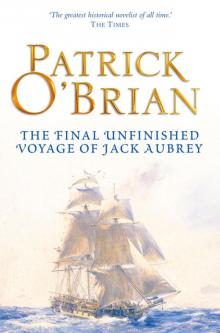 The Final Unfinished Voyage of Jack Aubrey
The Final Unfinished Voyage of Jack Aubrey The Rendezvous and Other Stories
The Rendezvous and Other Stories Caesar: The Life Story of a Panda-Leopard
Caesar: The Life Story of a Panda-Leopard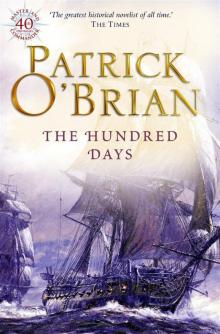 The Hundred Days
The Hundred Days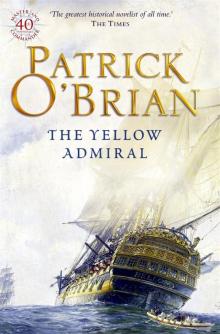 The Yellow Admiral
The Yellow Admiral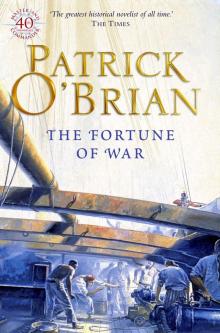 The Fortune of War
The Fortune of War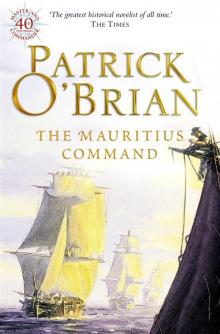 The Mauritius Command
The Mauritius Command Beasts Royal: Twelve Tales of Adventure
Beasts Royal: Twelve Tales of Adventure A Book of Voyages
A Book of Voyages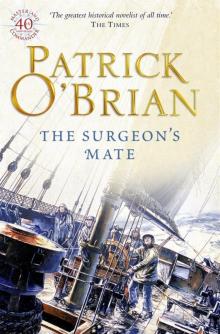 The Surgeon's Mate
The Surgeon's Mate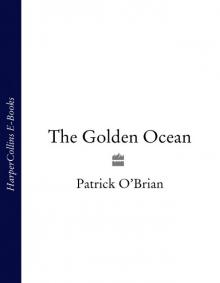 The Golden Ocean
The Golden Ocean Hussein: An Entertainment
Hussein: An Entertainment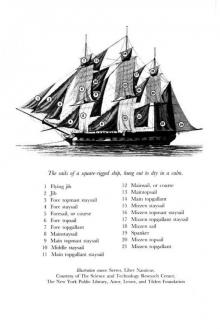 H.M.S. Surprise
H.M.S. Surprise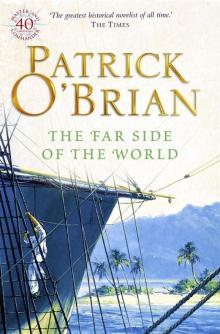 The Far Side of the World
The Far Side of the World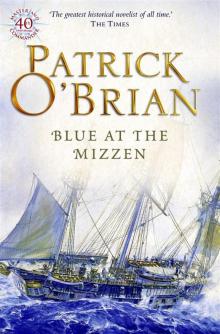 Blue at the Mizzen
Blue at the Mizzen The Unknown Shore
The Unknown Shore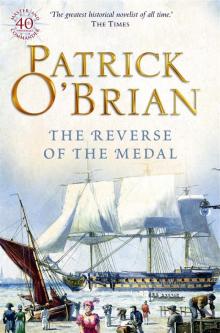 The Reverse of the Medal
The Reverse of the Medal Testimonies
Testimonies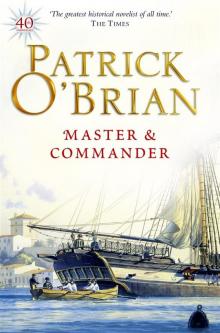 Master and Commander
Master and Commander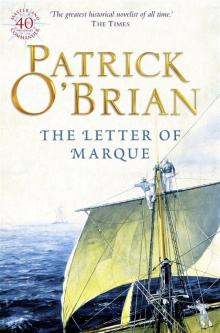 The Letter of Marque
The Letter of Marque Treason's Harbour
Treason's Harbour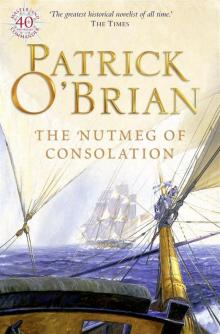 The Nutmeg of Consolation
The Nutmeg of Consolation 21: The Final Unfinished Voyage of Jack Aubrey
21: The Final Unfinished Voyage of Jack Aubrey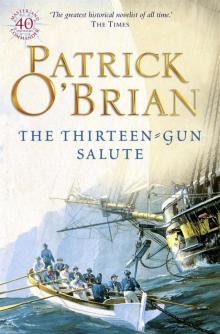 The Thirteen-Gun Salute
The Thirteen-Gun Salute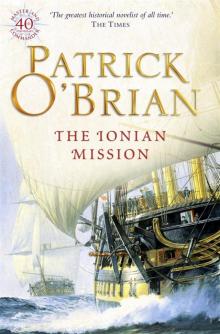 The Ionian Mission
The Ionian Mission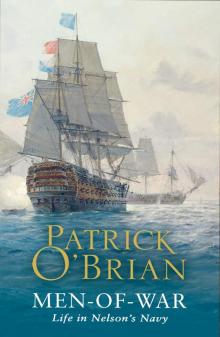 Men-of-War
Men-of-War The Commodore
The Commodore The Catalans
The Catalans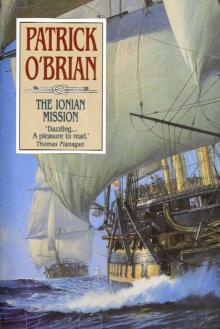 Aub-Mat 08 - The Ionian Mission
Aub-Mat 08 - The Ionian Mission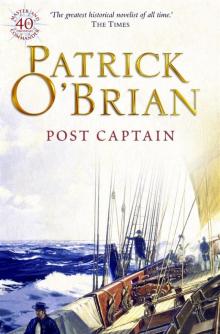 Post Captain
Post Captain The Road to Samarcand
The Road to Samarcand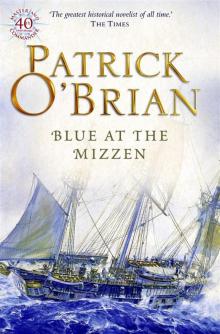 Book 20 - Blue At The Mizzen
Book 20 - Blue At The Mizzen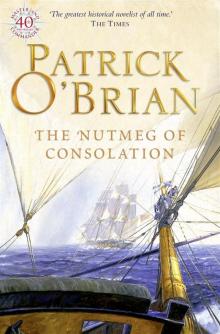 Book 14 - The Nutmeg Of Consolation
Book 14 - The Nutmeg Of Consolation Caesar
Caesar The Wine-Dark Sea
The Wine-Dark Sea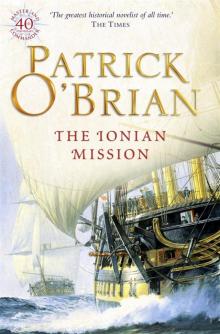 Book 8 - The Ionian Mission
Book 8 - The Ionian Mission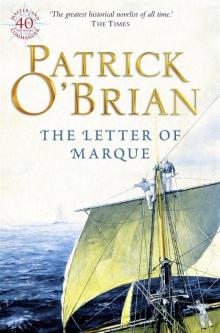 Book 12 - The Letter of Marque
Book 12 - The Letter of Marque Hussein
Hussein Book 9 - Treason's Harbour
Book 9 - Treason's Harbour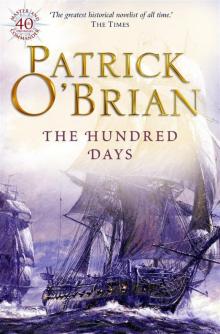 Book 19 - The Hundred Days
Book 19 - The Hundred Days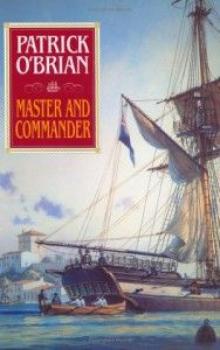 Master & Commander a-1
Master & Commander a-1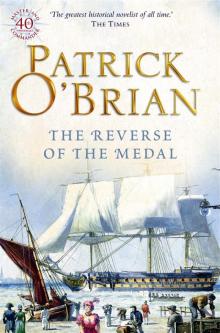 Book 11 - The Reverse Of The Medal
Book 11 - The Reverse Of The Medal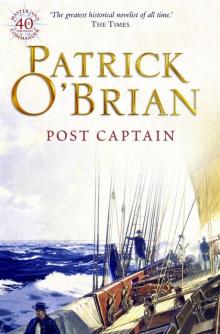 Book 2 - Post Captain
Book 2 - Post Captain The Truelove
The Truelove The Thirteen Gun Salute
The Thirteen Gun Salute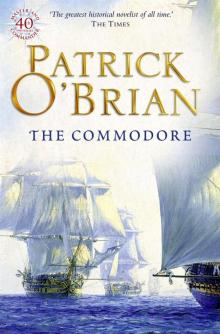 Book 17 - The Commodore
Book 17 - The Commodore The Final, Unfinished Voyage of Jack Aubrey
The Final, Unfinished Voyage of Jack Aubrey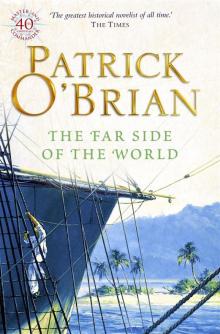 Book 10 - The Far Side Of The World
Book 10 - The Far Side Of The World Book 5 - Desolation Island
Book 5 - Desolation Island Beasts Royal
Beasts Royal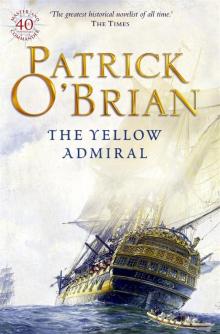 Book 18 - The Yellow Admiral
Book 18 - The Yellow Admiral Book 15 - Clarissa Oakes
Book 15 - Clarissa Oakes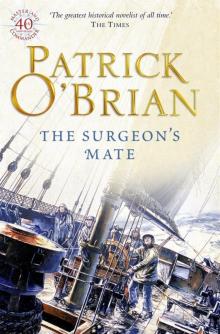 Book 7 - The Surgeon's Mate
Book 7 - The Surgeon's Mate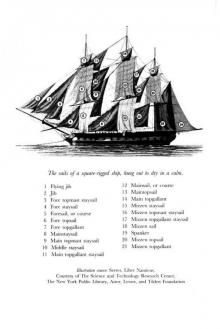 Book 3 - H.M.S. Surprise
Book 3 - H.M.S. Surprise Desolation island
Desolation island Picasso: A Biography
Picasso: A Biography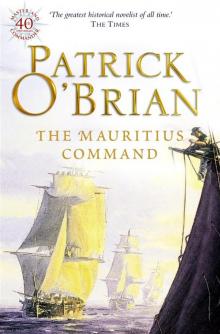 Book 4 - The Mauritius Command
Book 4 - The Mauritius Command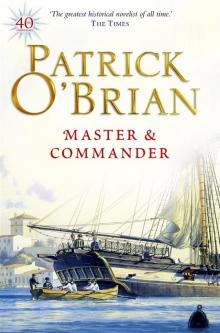 Book 1 - Master & Commander
Book 1 - Master & Commander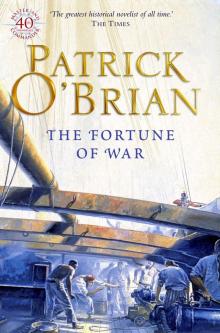 Book 6 - The Fortune Of War
Book 6 - The Fortune Of War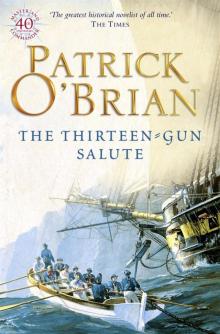 Book 13 - The Thirteen-Gun Salute
Book 13 - The Thirteen-Gun Salute Book 16 - The Wine-Dark Sea
Book 16 - The Wine-Dark Sea